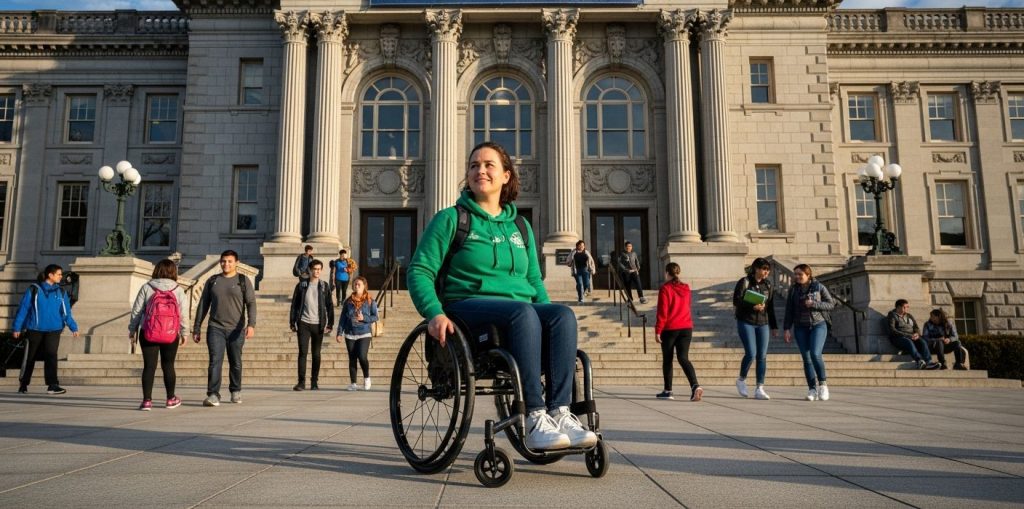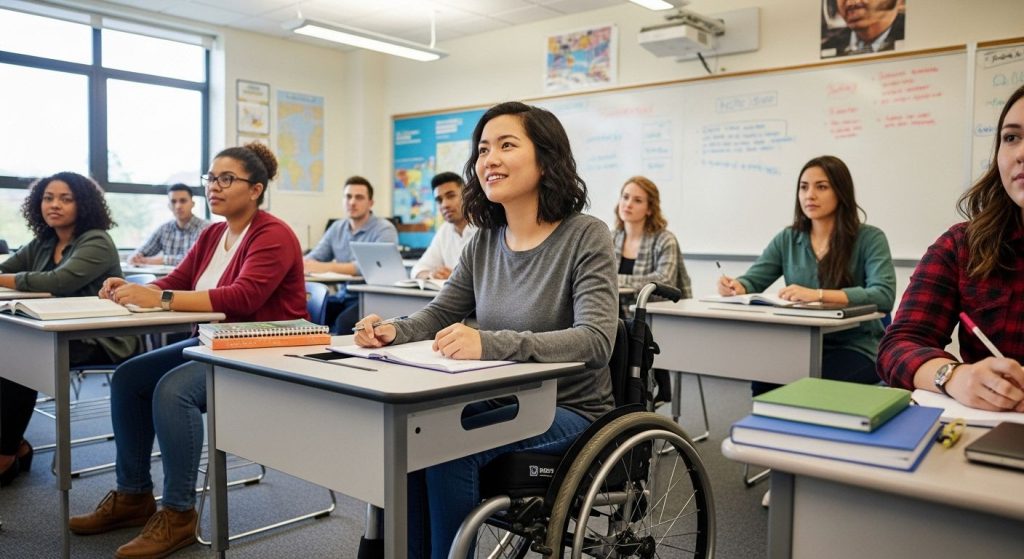Contact us today
Back to School With SCI: A Woman’s Guide to Thriving in Higher Education
Going back to school after a spinal cord injury can feel like standing at the edge of something exciting but uncertain. Whether you’re chasing a new career goal, switching fields, or returning to complete your degree, the thought of navigating campus life with SCI can feel overwhelming.
You might wonder if people will see your wheelchair before they see you. Or worry that your pace, your body, or your needs might hold you back. You might even question if getting that degree is still worth it. But here’s the truth: your education didn’t end with your injury.
You still deserve every opportunity to learn, grow, and show up for your dreams.
At HerSpine Solutions, we believe that going back to school isn’t just about lectures and exams; it’s about reclaiming your confidence, redefining independence, and preparing for the future you envision. This guide will walk you through practical steps for returning to higher education, from applications to accessibility, and everything in between.
Because education isn’t a privilege for the able-bodied; it’s your right, and your journey deserves to be supported every step of the way.

The Admission Process
Let’s be honest, applying for school after a spinal cord injury can feel like stepping into a system that wasn’t originally designed for you. You’re filling out forms, writing essays, and preparing documents just like everyone else, but there’s an extra layer of questions running through your mind:
“Will my disability affect their decision?” “Should I even mention it?”
Here’s the truth: your admission depends on your academic ability, not your injury. Most universities are legally required to evaluate all applicants on merit, not medical status. While applications often ask if you have a disability, you’re not required to give details at that stage. Here’s how to strengthen your application:
a). Lead with your strengths. Focus your essays on your goals, achievements, and the resilience that shapes your perspective.
b). Share your SCI story only if it’s relevant. If your injury experience shaped your career direction or passion for advocacy, weave it in naturally, not as a limitation, but as lived experience that deepens your purpose.
c). Request accessibility support early. If an in-person interview is part of the process, ask about accessible venues or request a virtual option.
“I sustained a C7-level spinal cord injury in high school, at a time where I wanted to visit some colleges over the summer. The visits were no longer viable, due to my inpatient physical and occupational therapy schedules, but I still intended to apply to college. After my injury, I went to a rehabilitation hospital that was close to home before transferring to Krieger Institute’s International Center for Spinal Cord Injury. There, a nurse told me I could go anywhere, and that belief made me apply to schools in California, Missouri, Georgia, North Carolina, New York and Massachusetts. Since then, I’ve graduated from Harvard, the University of Cambridge and Harvard’s Graduate School of Education. Truly, I could go anywhere.”
– Valerie Piro, PhD candidate at Princeton University’s Department of History
Remember: Education is not a privilege, it’s your right. You belong in academic spaces, fully and unapologetically.
💡If you’re nervous about advocating for yourself in academic settings, read our guide on reclaiming your voice after spinal cord injury.
When to Disclose Your Injury
Knowing when to disclose your spinal cord injury can feel tricky, especially when you’re unsure how disability is perceived at your school. Here’s a simple guide to help you navigate it:
During Admissions: You can check “yes” when asked about a disability, but you don’t need to give details yet. Save that conversation until you’ve secured your offer.
After Acceptance: Once admitted, it’s important to inform the school’s disability support office or student accessibility centre. Doing this early, ideally before classes begin, helps you secure accommodations like:
a). Wheelchair-accessible classrooms, dorms, and restrooms
b). Extended time for exams or assignments (for fatigue or medical needs
c). Flexible attendance options for medical appointments
d). Priority seating or space adjustments in lecture halls
The goal isn’t to share your medical history; it’s to outline what support helps you thrive.
Lecturers: You can choose to meet them early in the semester to discuss your accommodations and learning needs, or let the disability office handle it. There’s no obligation to explain your medical background, keep the focus on what enables you to participate fully.
Classmates: You owe no one an explanation. Share only what feels comfortable to you in social spaces. Friendships can grow naturally through shared experiences, not personal disclosures.
This approach keeps your energy where it belongs, on your goals, your growth, and your wellbeing, not on proving your worth to others.

Funding Opportunities & Scholarships
Higher education can be expensive, and living with a spinal cord injury often adds extra costs that many people don’t see, like mobility equipment, personal care, transport, and accessible housing. It’s okay to admit that funding your studies might feel overwhelming at first. The good news? There are ways to plan smartly and increase your chances of financial support.
Here’s how to approach funding strategically:
1. Explore disability-specific grants and bursaries.
Many universities have disability support funds that can cover assistive technology, personal care, or study adjustments. Some organisations also offer scholarships for students with physical disabilities. These may not always be widely advertised, so ask your university’s disability office directly and check national disability charities or foundations.
2. Look for broader scholarships that value resilience and leadership.
Even when scholarships aren’t disability-specific, you can still stand out. Frame your SCI journey as a story of perseverance, leadership, and vision, not limitation. Focus on what you’ve accomplished because of your lived experience, not in spite of it.
3. Apply early and often.
Many scholarship deadlines close months before the academic year starts. Create a funding calendar and apply to several opportunities, even smaller awards add up.
4. Seek support with applications.
If fatigue or accessibility makes writing long essays challenging, ask your disability adviser or mentor to review your applications or provide documentation support.
5. Plan for hidden costs.
Budget for accessible accommodation, transportation, personal care support, and technology. If possible, include these costs in your funding applications, some grants accept them as legitimate educational expenses.
Bonus tip: In the UK, students with long-term disabilities can apply for Disabled Students’ Allowance (DSA), which covers specialist equipment, non-medical helpers, and other study-related costs. If you’re outside the UK, check for similar national funding options.
Remember: applying for funding isn’t just about asking for help, it’s also about claiming the support you deserve to study, grow, and thrive.
Navigating Accommodations
Most universities today have disability support services that provide academic and housing accommodations, but getting what you truly need often depends on how well you advocate for yourself. Accessibility isn’t just about ramps and lifts; it’s about ensuring that every part of your learning environment supports your independence, safety, and success.
Here’s how to approach it:
1. Start early and document your needs.
Once you receive your admission letter, contact the university’s Disability Support Office or Accessibility Services. They’ll guide you through the documentation needed for your accommodations. Bring medical records or letters explaining how your SCI affects your daily life and learning.
2. Advocate clearly for functional needs.
Be specific about what helps you thrive. Don’t just say “I use a wheelchair”, explain what that means in practice. For instance:
a). “I’ll need accessible housing close to campus buildings.”
b). “I need extra time between classes due to fatigue.”
c). “I’ll require extended exam time or rest breaks.”
This clarity helps staff plan with you, not for you.
3. Review your housing setup before moving in.
Ask for a virtual or in-person tour to confirm that what’s labelled “accessible” truly meets your needs. Look for:
a). Ground-floor or elevator access with wide doorways
b). Grab bars, roll-in showers, and accessible bathrooms for catheterisation or bowel routines
c). Refrigerator space for medications
d). Proximity to classes, dining halls, and libraries
4. Secure academic adjustments that support flexibility.
Most universities offer:
a). Early registration to schedule classes around medical care
b). Accessible classroom layouts and assistive tech support
c). Extended exam time or private testing spaces
d). Flexible attendance policies for medical appointments or hospital visits
If a need arises mid-semester, reach out to your accessibility officer immediately, accommodations can be adjusted.
5. Learn the campus layout.
Familiarise yourself with:
a). Accessible entrances, routes, and elevators
Nearby accessible toilets
b). Shuttle or transport routes that pass your housing or key buildings
c). Reserved parking spaces close to class buildings (if you drive)
Remember: Accessibility isn’t a favour, it’s your right. Advocating for yourself isn’t about complaining; it’s about ensuring you can study in an environment that supports your full potential.
Bonus tip: If you’re studying in the UK, make sure to set up a Student Support Plan or Personal Learning Plan (PLP) through your university’s disability or inclusion office. These plans formally outline the adjustments you’re entitled to, such as extra time in exams, ergonomic seating, or note-taking support, and are shared discreetly with your lecturers.
💡If you’re moving to a new location for school, read our newsletter on travelling with a spinal cord injury.
Using Assistive Technology
Balancing academics with a spinal cord injury sometimes means finding tools that make studying easier and more comfortable. Assistive technology can bridge many gaps and help you learn in ways that work best for you. Here are some tools worth exploring:
a). Note-taking apps with audio recording and voice-to-text features, such as Notability or OneNote
b). Tablets with stylus for easy, hands-free note-taking
c). Textbooks in alternative formats, like audio, ebooks, or large print
d). Wheelchair cushions and backrests designed for extended sitting
e). Adjustable desks or laptop stands that suit wheelchair height
f). Campus navigation apps highlighting accessible routes
g). Medication reminder apps for timely care
h). Health tracking apps to help monitor symptoms
If cost is a concern, speak to your university’s disability support team. Many institutions offer assistive technology through DSA (Disabled Students’ Allowance) or short-term equipment loans. Don’t let affordability become a quiet barrier, ask about every option available.

Managing Your Health in School
Balancing your studies with the day-to-day realities of spinal cord injury takes strategy, flexibility, and a lot of grace. Some days will go smoothly; others might not. That’s okay. The goal is progress, not perfection.
Time Management
a). If possible, choose class times that match your peak energy levels, but don’t worry if your timetable isn’t ideal. Build in rest breaks between lectures or study sessions, even short ones.
b). Consider a reduced course load (for instance, 12 credits instead of 15) to give yourself breathing room and prevent burnout.
c). Use planners or scheduling apps to visualise your week and balance study, self-care, and recovery time.
Medical Appointment Coordination
a). Let your lecturers know about recurring appointments early on, so they understand if you need flexibility.
b). Ask about lecture recordings or online materials in case you miss class.
c). Use telehealth where possible to save time and energy.
d). Keep a medical explanation letter or disability support note on file to cover unavoidable absences.
On-campus Health Management
a). Save important emergency numbers, especially for healthcare providers familiar with SCI.
b). Visit the university’s health centre to learn their safety procedures and what services they offer.
c). Always keep a small “health kit” in your backpack: catheters, pads, medication, snacks, and anything that helps you feel secure when you’re away from your room.
Nutrition & Energy
a). Pack snacks that are easy to reach and eat between classes.
b). Stay hydrated throughout the day, don’t skip fluids to avoid bathroom trips. Instead, plan your water intake around accessible restrooms and class schedules so you can manage comfortably and safely.
c). If you use intermittent catheterisation, plan fluid intake and emptying times to avoid bladder discomfort or accidents during long classes.
d). Know where accessible dining areas are, especially if you have limited time between lectures.
Mental Health
a). University life can be intense. Reach out to campus counselling services that understand disability-related stress.
b). Find coping habits that keep you centred, journaling, mindfulness, prayer, or gentle exercise.
c). Most importantly, ask for help when you need it. It’s not weakness; it’s wisdom.
As you move through this journey, you might notice stares or awkward reactions. Try not to absorb them. Their discomfort isn’t yours to carry. You deserve to be in every classroom, lecture hall, and space your dreams lead you to.
Academic Success Strategies for Women with SCI
Thriving academically with SCI isn’t just about keeping up, it’s about finding systems that help you succeed on your terms. Here are some study strategies that can help:
Start assignments early to give yourself time if health issues arise.
a). Join or form study groups for shared notes, motivation, and friendship.
b). Break large projects into smaller tasks and set realistic deadlines.
c). Communicate with lecturers if health issues affect deadlines.
d). Create a plan for catching up on school work after medical absences (e.g. lecture recordings, study buddy notes, or short review sessions).

Remember: SCI-related issues like UTIs, fatigue, or pressure sores might happen during your studies. They don’t define your ability or your worth, they’re just part of the path you’re learning to manage. Every adjustment you make is a sign of strength, not limitation.
💡For more information, read our blog post on managing secondary conditions associated with SCI.
Connect With Others
Starting or returning to higher education while managing a spinal cord injury can feel overwhelming at first. That’s why building a supportive network is essential, both for your wellbeing and your academic success.
Many universities have disability and inclusion student groups where you can meet others who understand accessibility needs and can share first-hand advice about campus life. You can also join clubs and societies that reflect your wider interests, academic, cultural, or recreational, so your identity isn’t only tied to your injury. Just be mindful of accessibility when choosing activities or meeting venues.
If you’re looking for a virtual space of sisterhood and shared understanding, join the HerSpine Virtual Ladies Lounge. A bimonthly gathering where women with SCI share real experiences, practical tips, and encouragement. Whether you’re currently in school or preparing to return, you’ll meet others who’ve walked the path and are ready to cheer you on. Join our next meeting here.
Conclusion
Pursuing education as a woman living with a spinal cord injury isn’t about proving your worth, it’s about claiming the learning opportunities you fully deserve. Your path may look different, but that difference is part of your strength. Every class you attend, every essay you write, and every milestone you achieve is a bold step toward independence and self-fulfilment.
Yes, there will be challenges. But you’ll also gain resilience, self-advocacy, creativity, and time management skills that will serve you in every area of life, far beyond graduation.
Start where you are. Research the right programmes. Reach out to student support or disability services. Connect with other students who understand. Take one step, then another. Your educational journey is uniquely yours to shape.
Remember this truth: Education is your right, not a favour granted by sympathetic institutions. You belong in higher education. Your medical needs do not define your capacity to thrive.
💡 Remember to subscribe to our LinkedIn newsletter for more guidance on thriving with SCI in all areas of life.
FAQs
1. How do I know if a school is SCI-friendly?
Don’t rely only on a school’s website; request a physical or virtual campus tour that focuses on accessibility. During your visit, ask about classroom layouts, accommodation options, and funding opportunities for students with disabilities. Speak directly to current disabled students if you can, and look out for practical features like accessible transport, multiple ramped routes, safe emergency exits, and a responsive disability support office. The goal is to find a university where accessibility is part of the culture, not an afterthought.
2. How do I handle group projects when I have medical needs?
Be open with your group early on about your availability and any medical appointments that might affect meetings. You don’t need to share private details, just help others understand how best to collaborate. Use shared online tools like Google Docs or Teams to keep things running smoothly even when you can’t meet in person. If your group is uncooperative or inflexible, speak to your lecturer or course coordinator. Your health needs should never put your grades or participation at risk.
3. How do I build a social life on campus while living with SCI?
Start by connecting with disability student organisations, they’re a great space to find others who understand what accessibility really means. Then branch out into clubs, societies, and activities that reflect your interests. Before attending events, check accessibility details or visit the space ahead of time. Bring a friend if it helps you feel comfortable, and don’t feel pressured to attend events that aren’t accessible. Your social life might look different from others’, but it can still be vibrant, fulfilling, and full of real connection.
4. What if my accommodation requests are denied?
If your request is turned down, first clarify the reason with the disability services office, sometimes they simply need more documentation. If there’s still no valid explanation, remember that you have the right to reasonable accommodations under laws like the Equality Act 2010 in the UK or the ADA in the US. Follow the university’s appeals process and keep records of all correspondence. If necessary, seek support from your student union or an external disability rights body. You deserve an accessible learning environment, and you have every right to advocate for it.
